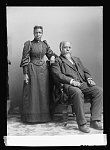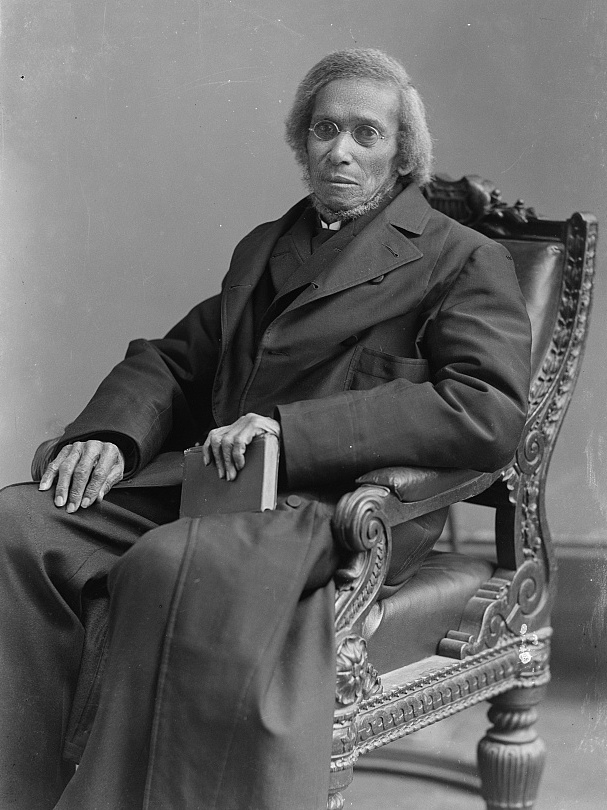|
Wesley John Gaines
Bishop Wesley John Gaines (October 4, 1840 – January 12, 1912) was an African-American church and community leader in Georgia. He was vice president of Payne Theological Seminary and co-founder of Morris Brown College. Early life Gaines was born in Wilkes County, Georgia, one of fourteen children of his enslaved parents, Louisa and William Gaines. He was named for John Wesley, the founder of Methodism, the religion of his father. His mother was a Baptist. He grew up on a plantation as a slave. He learned the alphabet when he was eleven and then learned to write using a copy book. Sick as a child, he taught himself to read while in bed. He took to religion at a young age, reading the bible and experiencing conversion when he was nine years of age. By the time he was fifteen or sixteen years of age, he became interested in becoming a preacher. In 1855, he was moved to Stewart County, Georgia and the following year to Muskogee County, Georgia. At more than 300 pounds and 6'2" ... [...More Info...] [...Related Items...] OR: [Wikipedia] [Google] [Baidu] |
Wilkes County, Georgia
Wilkes County is a county located in the east central portion of the U.S. state of Georgia. As of the 2010 census, the population was 10,593. The county seat is the city of Washington. Referred to as "Washington-Wilkes", the county seat and county are commonly treated as a single entity by locals, including the area's historical society and the Chamber of Commerce. It is part of the Central Savannah River Area (CSRA). History Wilkes County, named for British politician and supporter of American independence, John Wilkes, is considered Georgia's first county established by European Americans; it was the first of eight original counties created in the first state constitution on February 5, 1777. The other seven counties were organized from existing colonial parishes. Wilkes was unique in being made up of land ceded in 1773 by the indigenous Creek and Cherokee Native American nations in their respective Treaties of Augusta. Its location was unique due to its close proximity to ... [...More Info...] [...Related Items...] OR: [Wikipedia] [Google] [Baidu] |
Wilberforce University
Wilberforce University is a private historically black university in Wilberforce, Ohio. Affiliated with the African Methodist Episcopal Church (AME), it was the first college to be owned and operated by African Americans. It participates in the United Negro College Fund. Central State University, also in Wilberforce, Ohio, began as a department of Wilberforce University where Ohio state legislators could sponsor scholarship students. The college was founded in 1856 by a unique collaboration between the Cincinnati, Ohio, Conference of the Methodist Episcopal Church and the African Methodist Episcopal Church (AME) to provide classical education and teacher training for black youth. It was named after William Wilberforce. The first board members were leaders both black and white. The outbreak of the American Civil War (1861–65) resulted in a decline in students from the South, who were the majority, and the college closed in 1862 because of financial losses. The AME Church pu ... [...More Info...] [...Related Items...] OR: [Wikipedia] [Google] [Baidu] |
People From Atlanta
A person ( : people) is a being that has certain capacities or attributes such as reason, morality, consciousness or self-consciousness, and being a part of a culturally established form of social relations such as kinship, ownership of property, or legal responsibility. The defining features of personhood and, consequently, what makes a person count as a person, differ widely among cultures and contexts. In addition to the question of personhood, of what makes a being count as a person to begin with, there are further questions about personal identity and self: both about what makes any particular person that particular person instead of another, and about what makes a person at one time the same person as they were or will be at another time despite any intervening changes. The plural form "people" is often used to refer to an entire nation or ethnic group (as in "a people"), and this was the original meaning of the word; it subsequently acquired its use as a plural form of per ... [...More Info...] [...Related Items...] OR: [Wikipedia] [Google] [Baidu] |
African Methodist Episcopal Church Clergy
African or Africans may refer to: * Anything from or pertaining to the continent of Africa: ** People who are native to Africa, descendants of natives of Africa, or individuals who trace their ancestry to indigenous inhabitants of Africa *** Ethnic groups of Africa *** Demographics of Africa *** African diaspora ** African, an adjective referring to something of, from, or related to the African Union ** Citizenship of the African Union ** Demographics of the African Union **Africanfuturism ** African art ** *** African jazz (other) ** African cuisine ** African culture ** African languages ** African music ** African Union ** African lion, a lion population in Africa Books and radio * ''The African'' (essay), a story by French author J. M. G. Le Clézio * ''The African'' (Conton novel), a novel by William Farquhar Conton * ''The African'' (Courlander novel), a novel by Harold Courlander * ''The Africans'' (radio program) Music * "African", a song by Peter T ... [...More Info...] [...Related Items...] OR: [Wikipedia] [Google] [Baidu] |
19th-century American Slaves
The 19th (nineteenth) century began on 1 January 1801 ( MDCCCI), and ended on 31 December 1900 ( MCM). The 19th century was the ninth century of the 2nd millennium. The 19th century was characterized by vast social upheaval. Slavery was abolished in much of Europe and the Americas. The First Industrial Revolution, though it began in the late 18th century, expanding beyond its British homeland for the first time during this century, particularly remaking the economies and societies of the Low Countries, the Rhineland, Northern Italy, and the Northeastern United States. A few decades later, the Second Industrial Revolution led to ever more massive urbanization and much higher levels of productivity, profit, and prosperity, a pattern that continued into the 20th century. The Islamic gunpowder empires fell into decline and European imperialism brought much of South Asia, Southeast Asia, and almost all of Africa under colonial rule. It was also marked by the collapse of the large S ... [...More Info...] [...Related Items...] OR: [Wikipedia] [Google] [Baidu] |
People From Wilkes County, Georgia
A person (plural, : people) is a being that has certain capacities or attributes such as reason, morality, consciousness or self-consciousness, and being a part of a culturally established form of social relations such as kinship, ownership of property, or legal obligation, legal responsibility. The defining features of personhood and, consequently, what makes a person count as a person, differ widely among cultures and contexts. In addition to the question of personhood, of what makes a being count as a person to begin with, there are further questions about personal identity and self: both about what makes any particular person that particular person instead of another, and about what makes a person at one time the same person as they were or will be at another time despite any intervening changes. The plural form "people" is often used to refer to an entire nation or ethnic group (as in "a people"), and this was the original meaning of the word; it subsequently acquired its us ... [...More Info...] [...Related Items...] OR: [Wikipedia] [Google] [Baidu] |
Bishops In Georgia (U
A bishop is an ordained clergy member who is entrusted with a position of authority and oversight in a religious institution. In Christianity, bishops are normally responsible for the governance of dioceses. The role or office of bishop is called episcopacy. Organizationally, several Christian denominations utilize ecclesiastical structures that call for the position of bishops, while other denominations have dispensed with this office, seeing it as a symbol of power. Bishops have also exercised political authority. Traditionally, bishops claim apostolic succession, a direct historical lineage dating back to the original Twelve Apostles or Saint Paul. The bishops are by doctrine understood as those who possess the full priesthood given by Jesus Christ, and therefore may ordain other clergy, including other bishops. A person ordained as a deacon, priest (i.e. presbyter), and then bishop is understood to hold the fullness of the ministerial priesthood, given responsibility by ... [...More Info...] [...Related Items...] OR: [Wikipedia] [Google] [Baidu] |


_1938.jpg)

